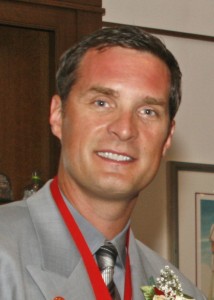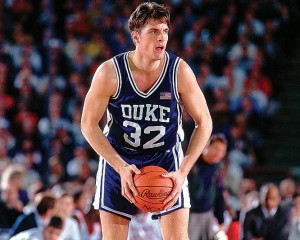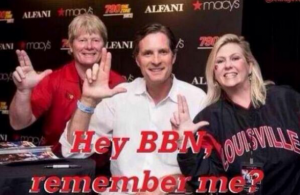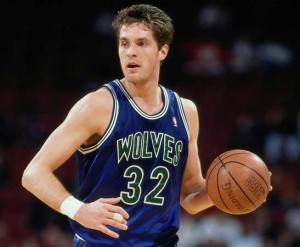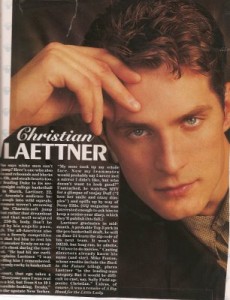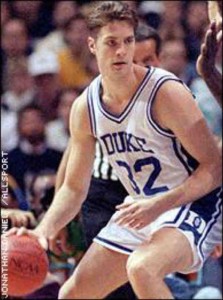Federal Law mandates that Selection Sunday is the day that you all new college basketball related media products must be rolled out. The documentaries about Michigan’s Fab 5 freshmen and UNLV’s early ’90s teams both debuted on the Sunday in which the brackets were announced in their respective years.
Immediately following this year’s bracket unveiling you can catch the debut of a new 30 for 30 with perhaps the most compelling title ever: “I Hate Christian Laettner.”(directed by Rory Karpf)
It’s premiering Sunday, March 15, at 9 p.m. ET after Bracketology on ESPN. (Here’s our preview)
Bare in mind that the version we watched is a “rough cut,” as ESPN PR told us, and could end up being somewhat different from the version that will air Sunday night for the general public. Still, this one is could be at the top of the ESPN 30 for 30 all time top ten list.
In order to fully appreciate the film’s value, I suggest you screen the Fab 5 and UNLV docs as well. Then, upon viewing “I hate Christian Laettner,” you can truly enjoy all three on an even greater level.
I recently had an exclusive with Christian Laettner, and I did not back down from asking him why he thinks that both he and the Duke program are so polarizing. You can hear his answer here.
Christian Laettner, Duke, UNLV and Michigan all came together in the early 1990s to take college basketball to the next level of popularity. The 1979 title game between Magic Johnson’s Michigan State and Larry Bird’s Indiana State put college basketball on the map, but the colorful characters of the early ’90s, the heroes and villains of that era (listed above and profiled in these documentaries) finally made March Madness mainstream.
You can’t have an “I hate Christian Laettner” unless you understand the context of Laettner’s greatest moments, and that’s what this 30 for 30 probably does best.
Karpf breaks down “I hate Christian Laettner” into the five main categories that all coalesce to inspire hatred towards him.
1. Privilege
As Karpf shows, Laettner actually came from a working class family and if it weren’t for his amazing basketball skills, he wouldn’t have been able to attend both an elite prep school, and then later Duke University. His family didn’t have the resources. They actually came from a gritty part of Buffalo.
We just assumed Laettner came from an upper class family because he was a Dukie; “and when you assume, you make an ass of u and me.”
2. White
From 1989-1996, every single white middle class or white upper class tween and teen wanted to be black. DID YOU READ THAT MOM AND DAD?
MY PARENTS NEED TO SEE THIS DOCUMENTARY.
I can relate to the panelists articulating this idea in the film because I was just like them. Gangsta rap went mainstream in 1991, and I spent my high school and junior high school years wanting to be black. As I hate Christian Laettner reminds us, Duke, and Laettner himself is very WHITE.
Therefore, he wasn’t trendy at the time. As Laettner’s success grew, so did the backlash against him.
3. Bully
As the movie shows, Laettner bullied his opponents and even his teammates. He was THE guy that you loved when he was on your side, but hated to play against. Remember when Laettner made “the shot” in the 1992 tournament regional final game against Kentucky? Well, he actually stomped on one of his opponents when he was down earlier in the contest, and had that dirty play been officiated, Laettner likely wouldn’t have been allowed to stay in the game. So maybe that signature moment of March Madness never actually happens, if this were a totally just world.
Point three is where we see the thin line between “I hate Christian Laettner” and “I love to hate Christian Laettner.”
4. Greatness
“They hate us cuz they ain’t us” truly applies to Laettner and Duke. There’s plenty of reason to hate both beyond point four, but the fourth point is HUGE.
5. Looks
Ah, the delicious irony of a Rob Lowe narration stating that the good looking are given special privileges in life; while images of Lowe coincide with Lowe’s voiceover.
“Hi, I’m Rob Lowe and I have cable.”
“And I’m delightfully ironic Rob Lowe and I have Direct TV.”
As Lowe narrates, Laettner was a real life Johnny from Karate Kid- the perfect villain who always had the perfect hair. So essentially, Billy Czapka explains a small portion of the Laettner backlash, much like he explains a small part of the Jay Cutler backlash.
Laettner, the director and a couple more people involved in the film are doing a media conference call next week; so we’ll have more on “I hate Christian Laettner” later.
Paul M. Banks owns, operates and writes The Sports Bank.net, which is partnered with Fox Sports Digital, eBay, Google News and CBS Interactive. You can read Banks’ feature stories in the Chicago Tribune RedEye newspaper and listen to him on KOZN 1620 The Zone.
Follow him on Twitter (@paulmbanks)
